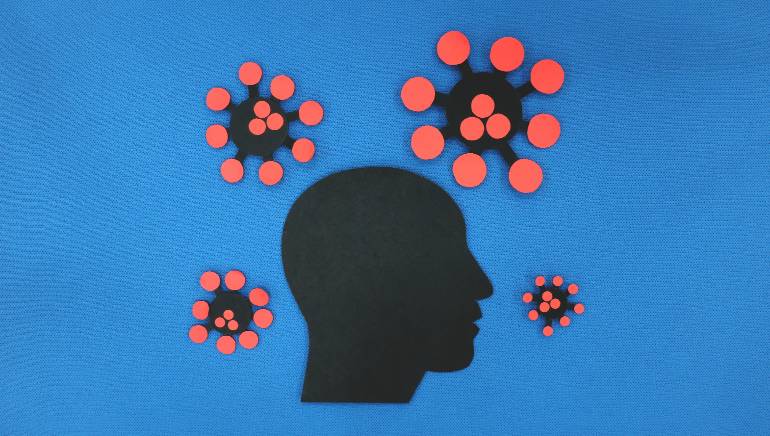The Covid-19 pandemic has been found to accelerate brain ageing by approximately 5.5 months, negatively impacting cognitive health.
The Covid-19 pandemic has impacted life as we know it, leaving a lasting mark on our physical health and well-being. While most of the focus has been on the virus itself, recent findings suggest that the pandemic has also had a significant impact on our cognitive health, particularly in terms of Covid-19 brain ageing. The research involved analysing brain scans from 1,000 individuals. These scans were taken as the pandemic unfolded and were compared to those collected during “normal” times, serving as a benchmark for typical brain ageing.
Does Covid accelerate brain ageing?
A study published on July 22, 2025, in Nature Communications, offers compelling insights into how living through this unprecedented crisis has impacted the ageing of our brains—regardless of whether we contracted the virus.
One of the study’s most striking conclusions was that individuals who lived through the pandemic experienced accelerated brain ageing associated with Covid-19, with brain ageing approximately 5.5 months faster than that of those studied before the crisis. This accelerated ageing was evident regardless of Covid-19 infection status, indicating that factors unrelated to the virus—such as increased stress and altered daily routines—played a significant role.
Does Covid cause brain ageing?
The researchers assessed various measures, including:
- Brain function
- Grey and white matter volume
- Cognitive skills
- Chronological age
Grey matter is required for functions such as memory, emotion regulation, and motor control, all of which can be impacted by Covid-19 brain ageing. White matter plays a vital role in transmitting signals between nerve cells.
“Initial brain imaging and earlier studies have demonstrated that patients who have contracted Covid-19, especially those experiencing moderate to severe conditions, have displayed less grey matter in regions involved in memory and emotional control. This trend resembles the first variations observed in a few neurodegenerative disorders,” explains Dr Neha Kapoor, Associate Director and Head-Neurology, Asian Hospital.
How does Covid impact the brain?
During the pandemic, many people experienced significant disruptions:
- Reduced social interactions
- Increased isolation
- Declines in physical activity
- Emotional stress
These factors collectively contributed to the acceleration of brain ageing, as evidenced by the study’s findings. The research emphasises that everyday life activities can influence brain health. Significant societal changes, such as those brought about by the Covid-19 pandemic, can have long-term implications for even healthy individuals, including effects like Covid-19 brain ageing.
“Not only severe Covid infection may provoke a robust inflammatory process in the brain, but mild Covid infection can also do so, causing damage to neural pathways and resulting in the loss of cognitive performance capacities, such as memory, attention, and decision-making”, shares Dr Kapoor.

Who was at higher risk of rapid brain ageing due to Covid-19?
The impact of the pandemic was not uniform. Specific demographics experienced more pronounced effects:
- Men and older people
- Individuals with compromised health
- Those with lower educational status, income, or unstable housing
For instance, people with less stable employment showed an average of five additional months of brain ageing compared to those in stable jobs. Likewise, individuals in poorer health experienced an increase of approximately four months in brain age relative to their healthier counterparts, further complicating issues related to Covid-19 brain ageing as per the Science Media Centre.
How does Covid affect cognitive ability?
Interestingly, only those infected with Covid-19 demonstrated a decline in cognitive skills. However, non-infected individuals also experienced signs of accelerated brain ageing, reaffirming the need to recognise the pandemic’s extensive effects on health beyond physical symptoms, according to the Science Media Centre.
Tips for brain health
While the study did not directly address specific interventions to combat brain ageing, it noted that certain lifestyle strategies are vital, especially in stressful times. Dr Kapoor emphasises the importance of incorporating cognitive screening and mental health care into post-covid care to prevent instances of such effects.
- Healthy diet: Consuming a balanced diet rich in nutrients can support cognitive health. Foods rich in omega-3 fatty acids, antioxidants, and vitamins are particularly beneficial, as per the NIH Office of Dietary Supplements.
- Regular exercise: Engaging in physical activity not only boosts mood but also enhances cognitive functions, providing protective benefits for brain health.
- Adequate sleep: Quality sleep is vital for memory consolidation and overall brain function. Prioritising sleep hygiene can help mitigate some of the effects of stress.
- Social interactions: Maintaining connections with family and friends can help reduce feelings of isolation and promote mental wellness.
- Cognitive challenges: Engaging the brain through puzzles, reading, and learning new skills can help strengthen cognitive resilience.
While these tips are known to support brain health, the study suggests that whether they can specifically reverse the changes observed during the pandemic, such as Covid-19 brain ageing, is still a matter for future research.
Get latest updates on health and wellness along with Health News






